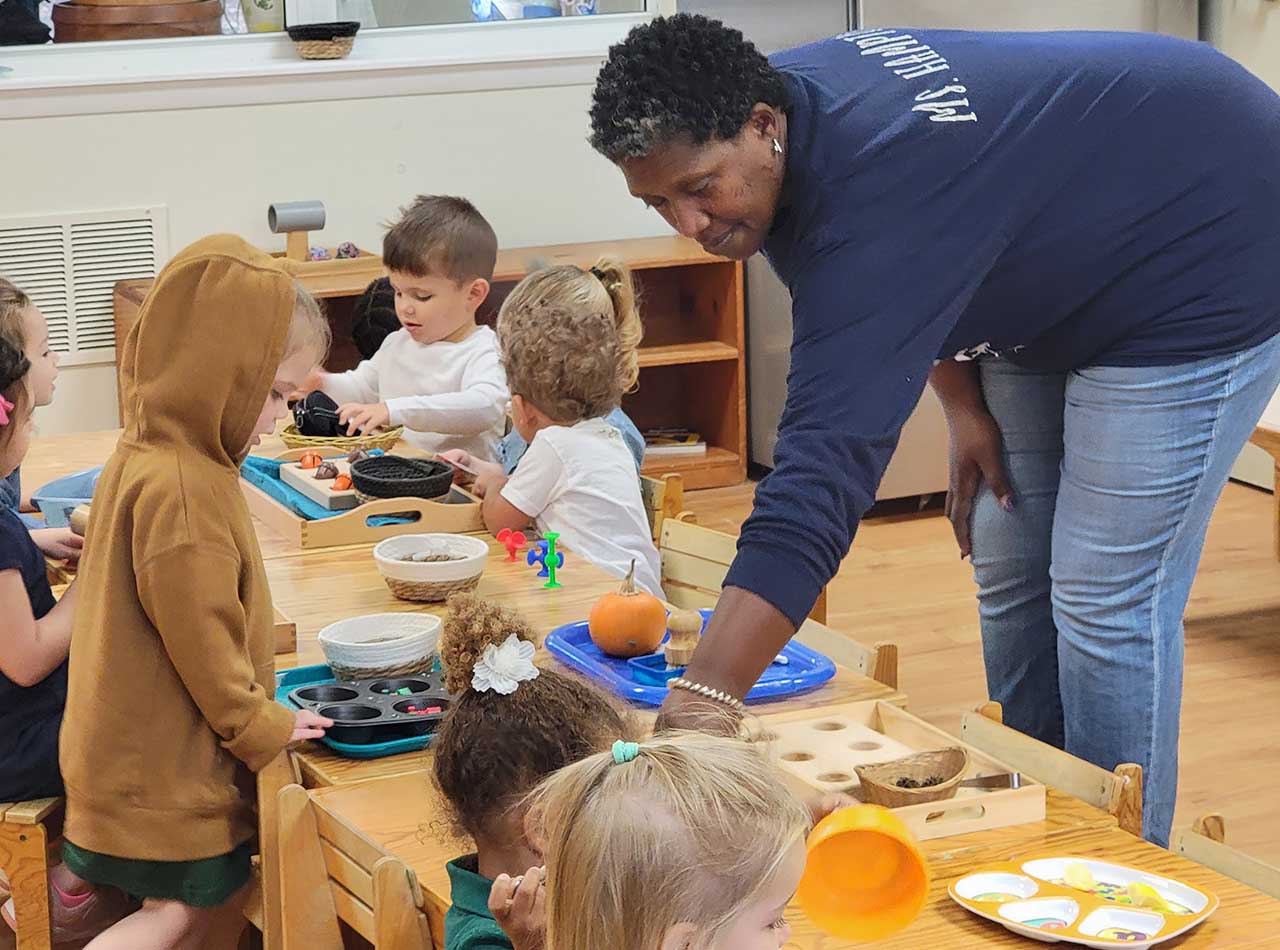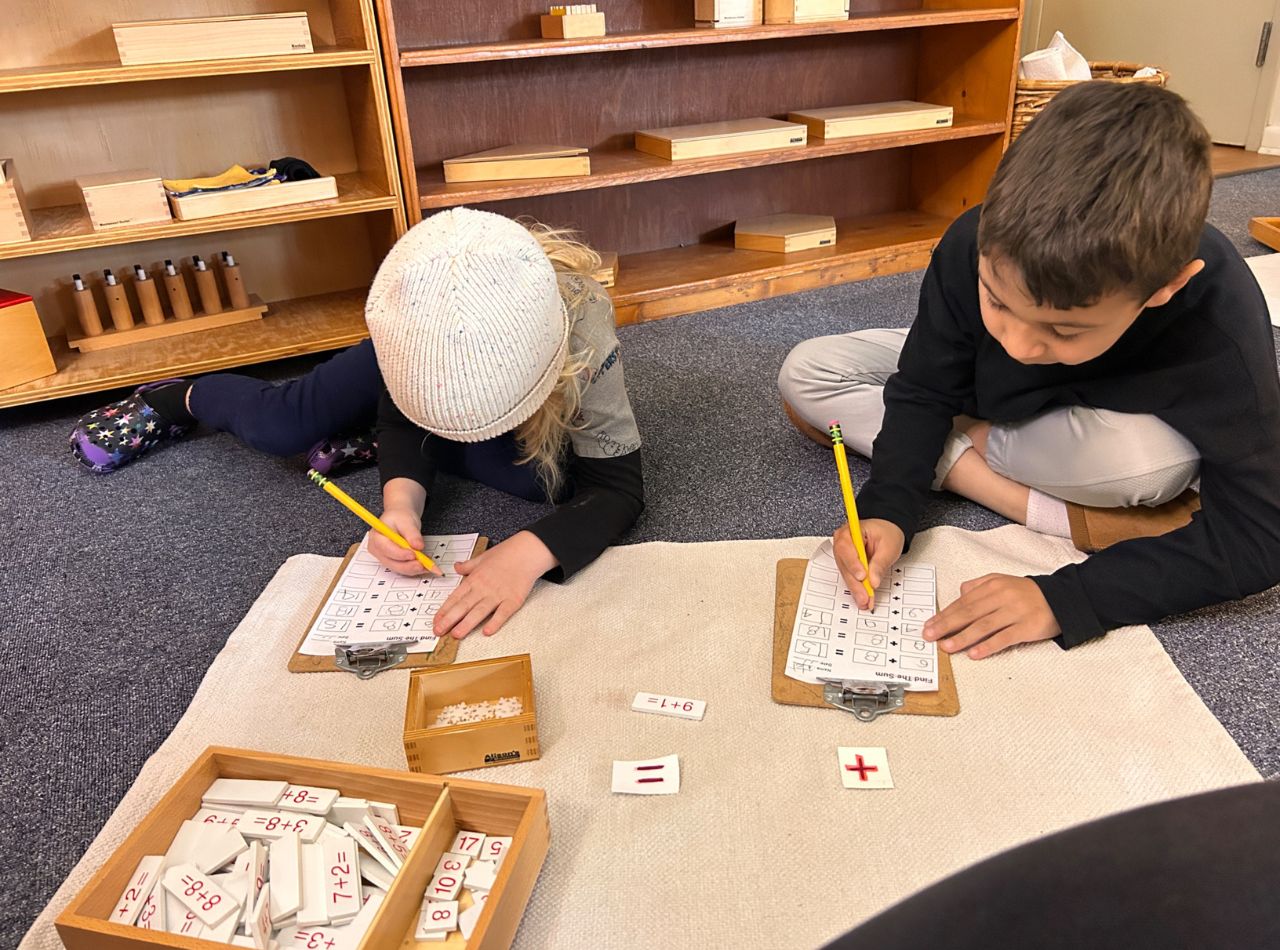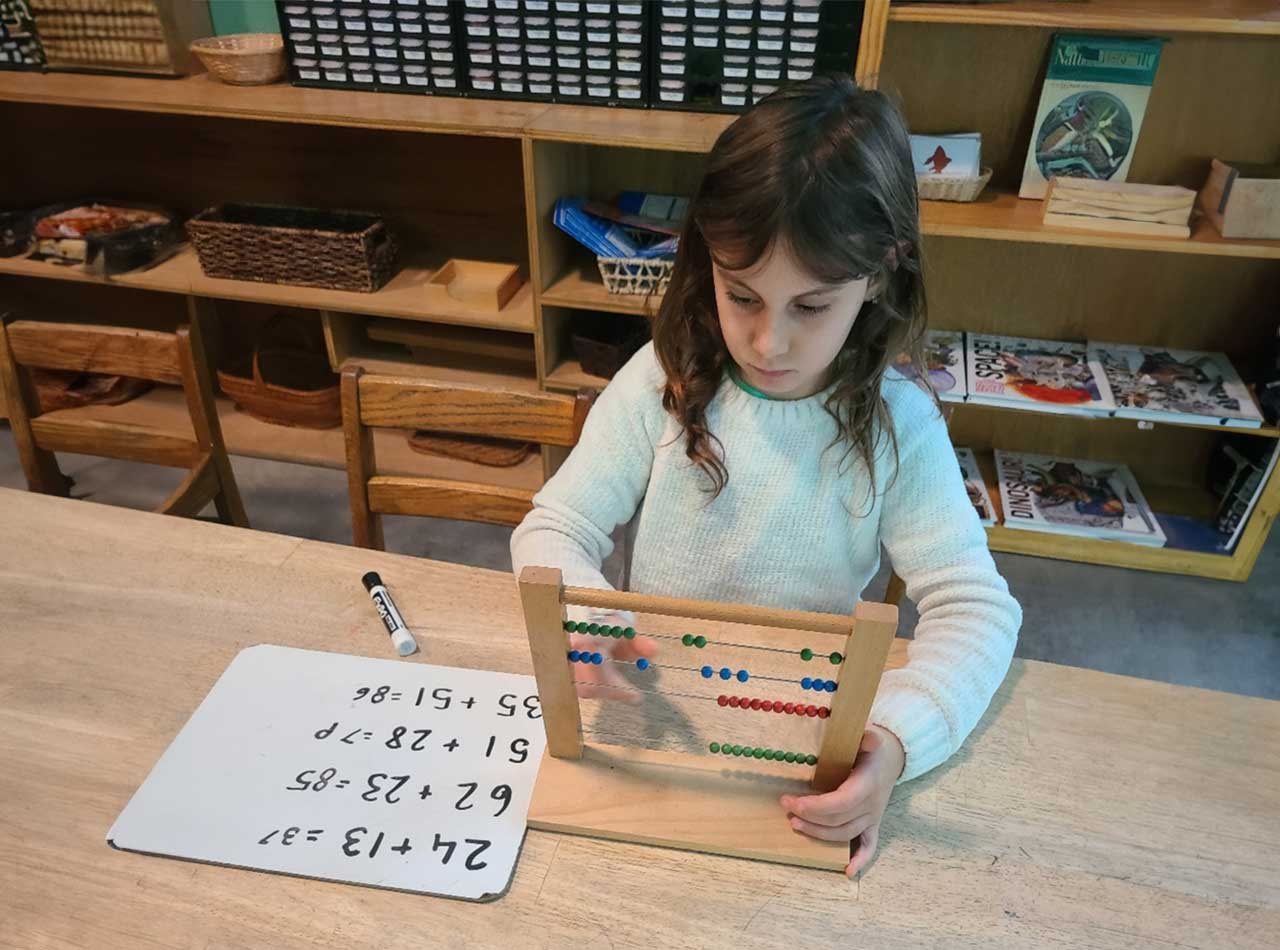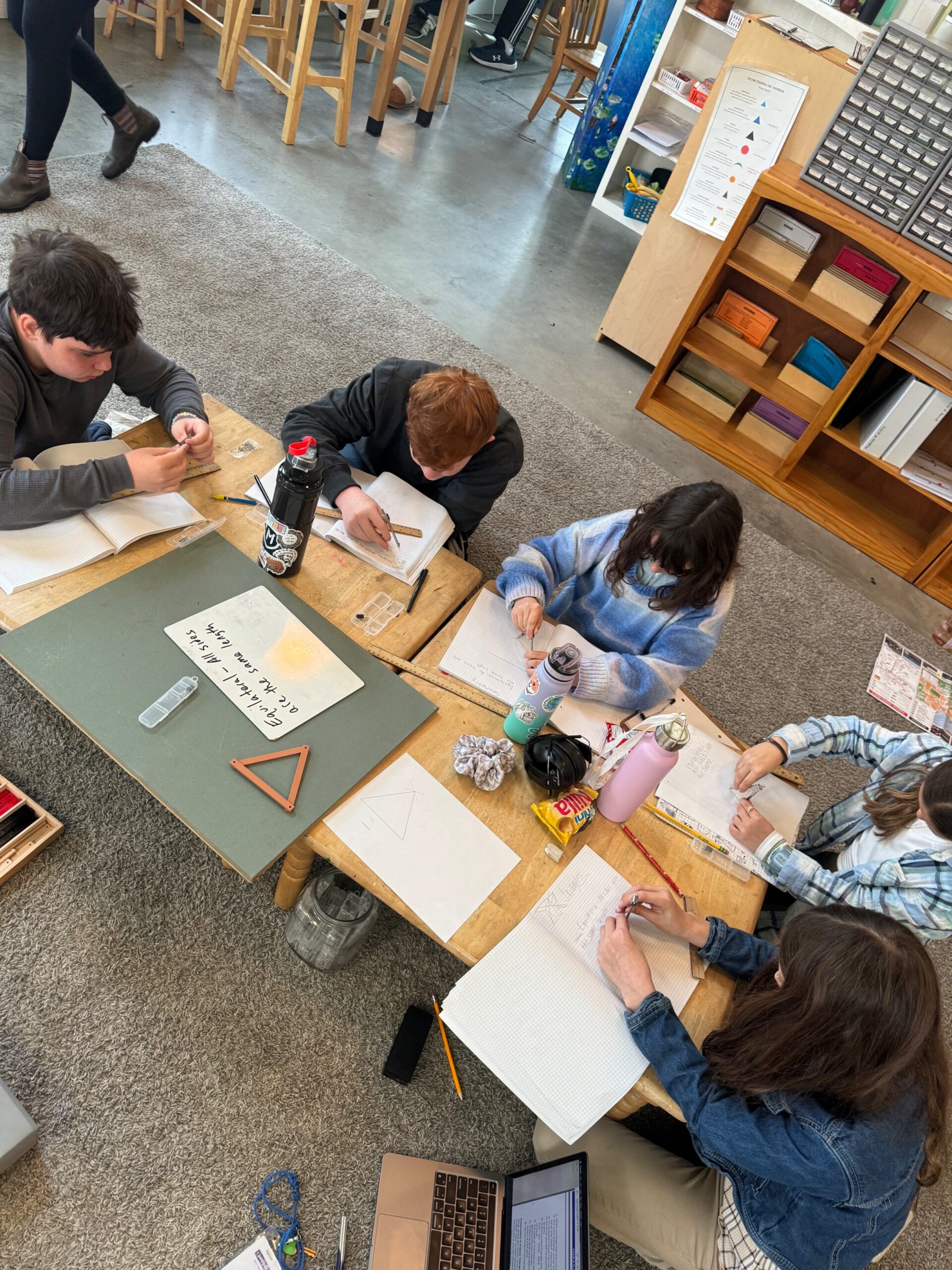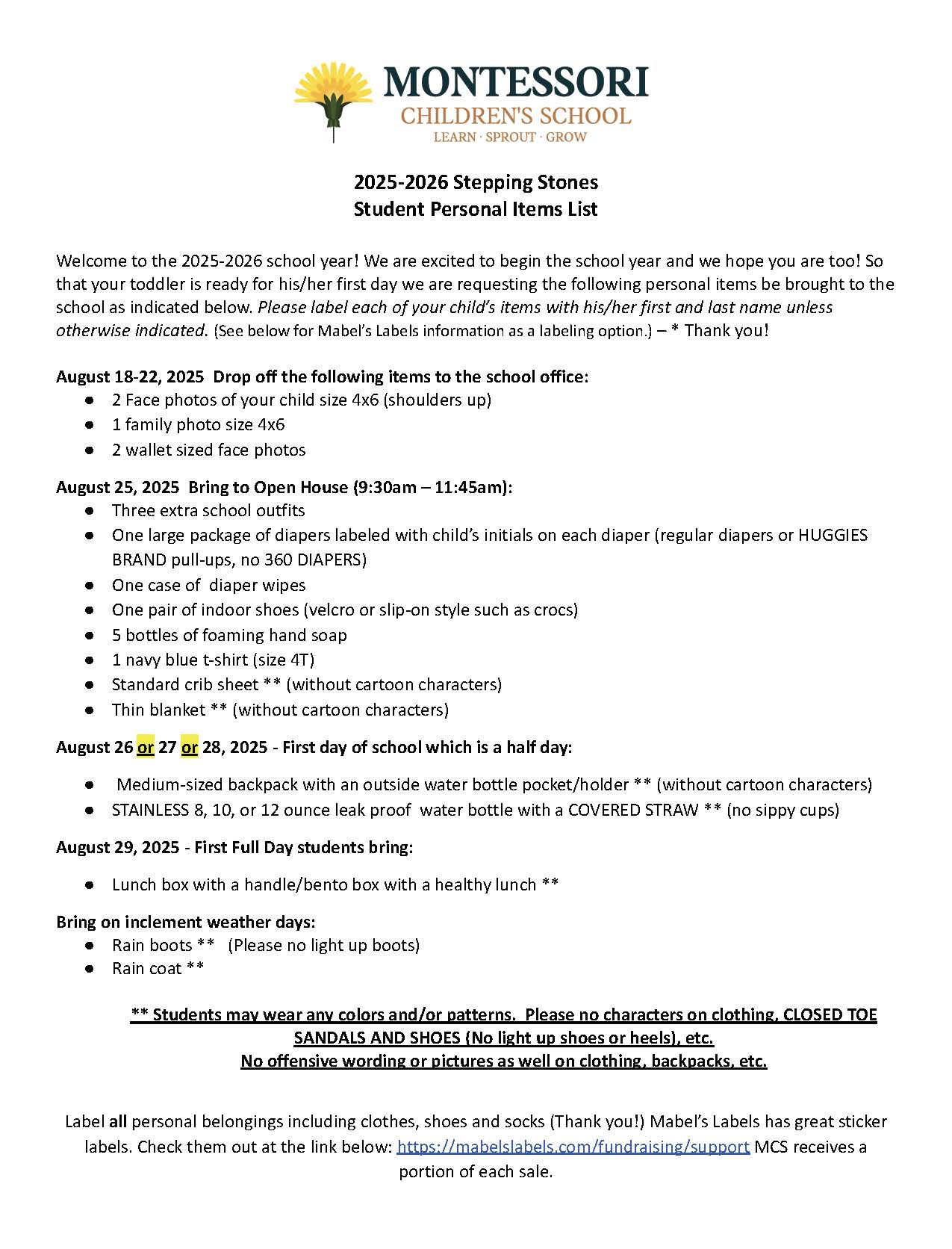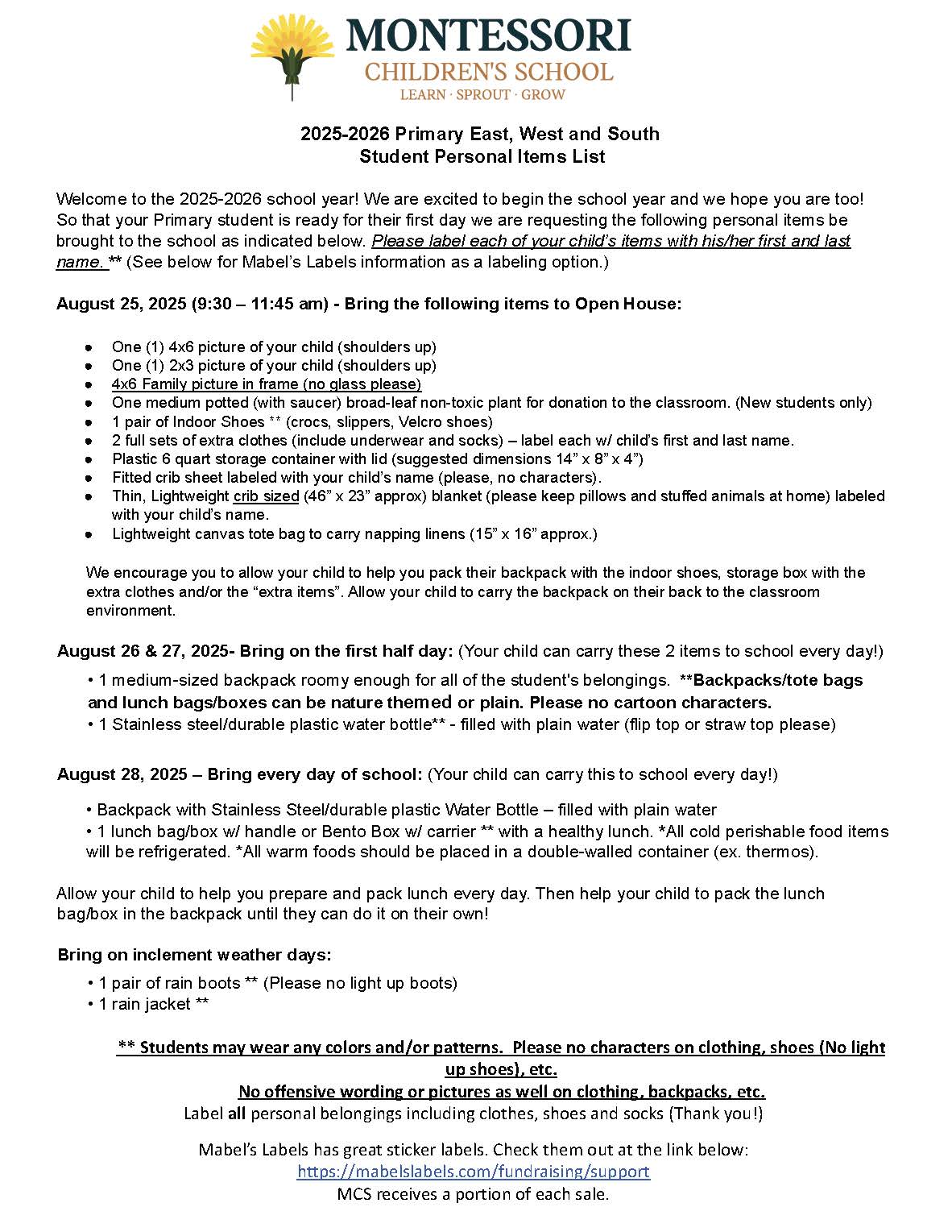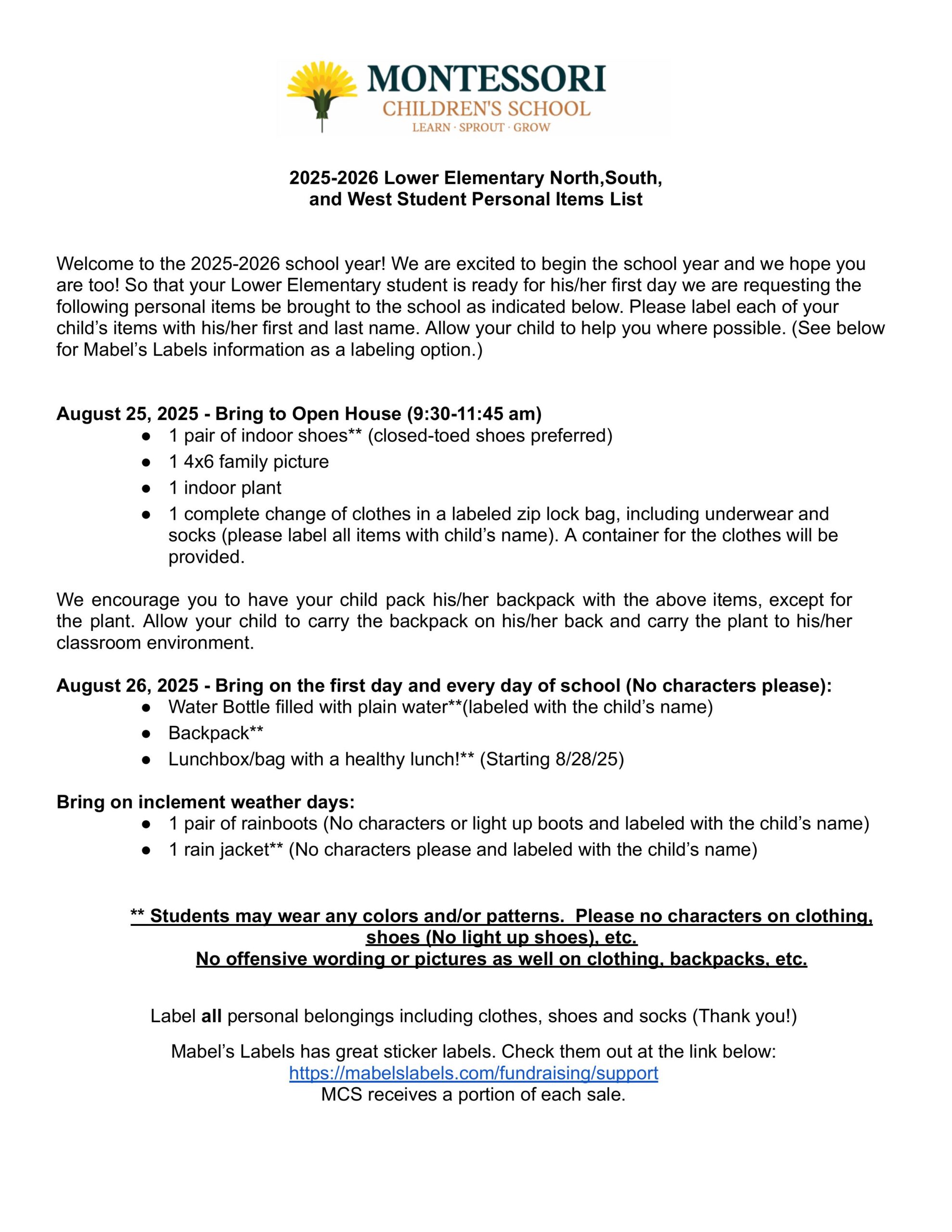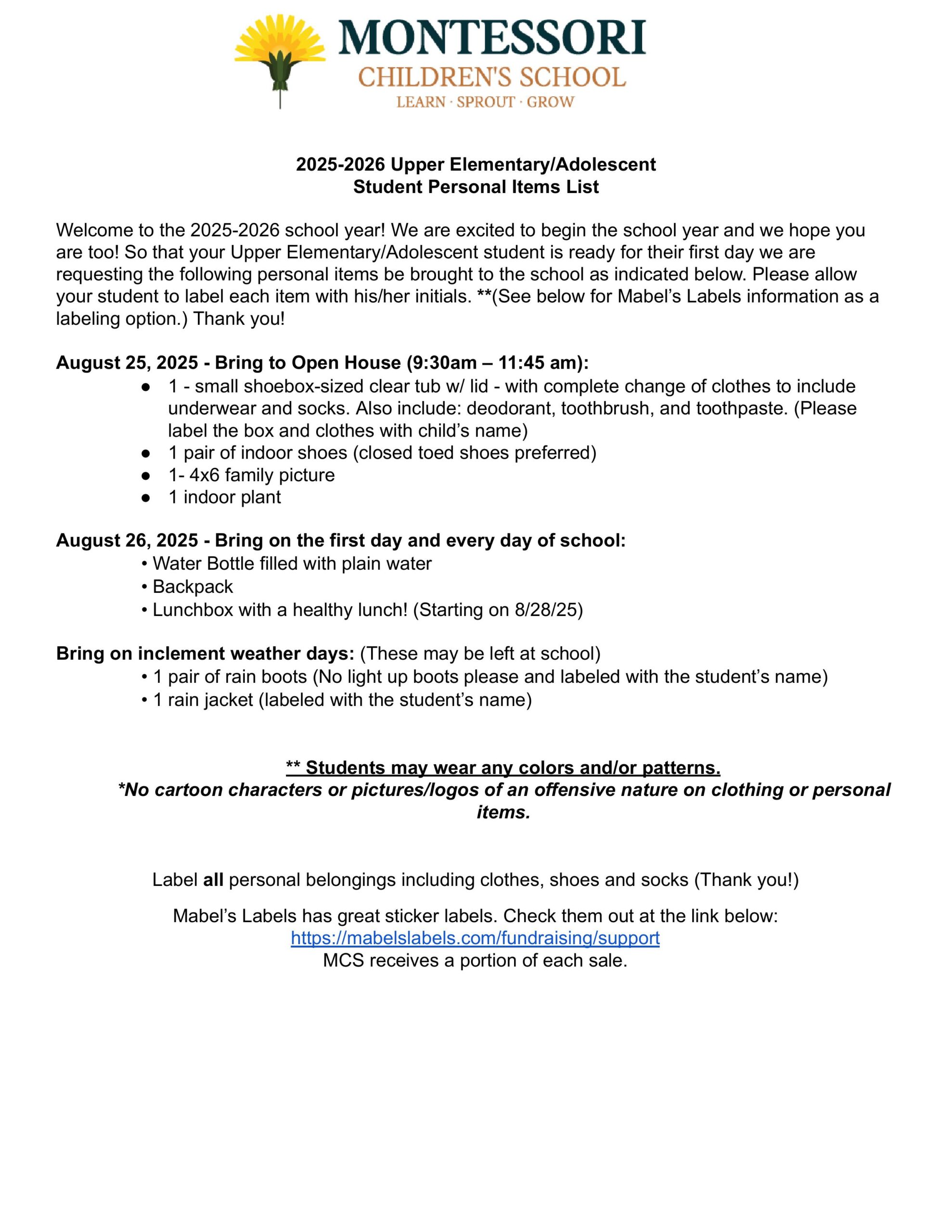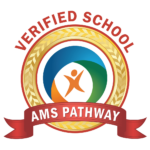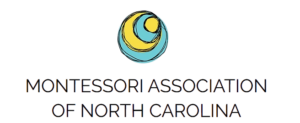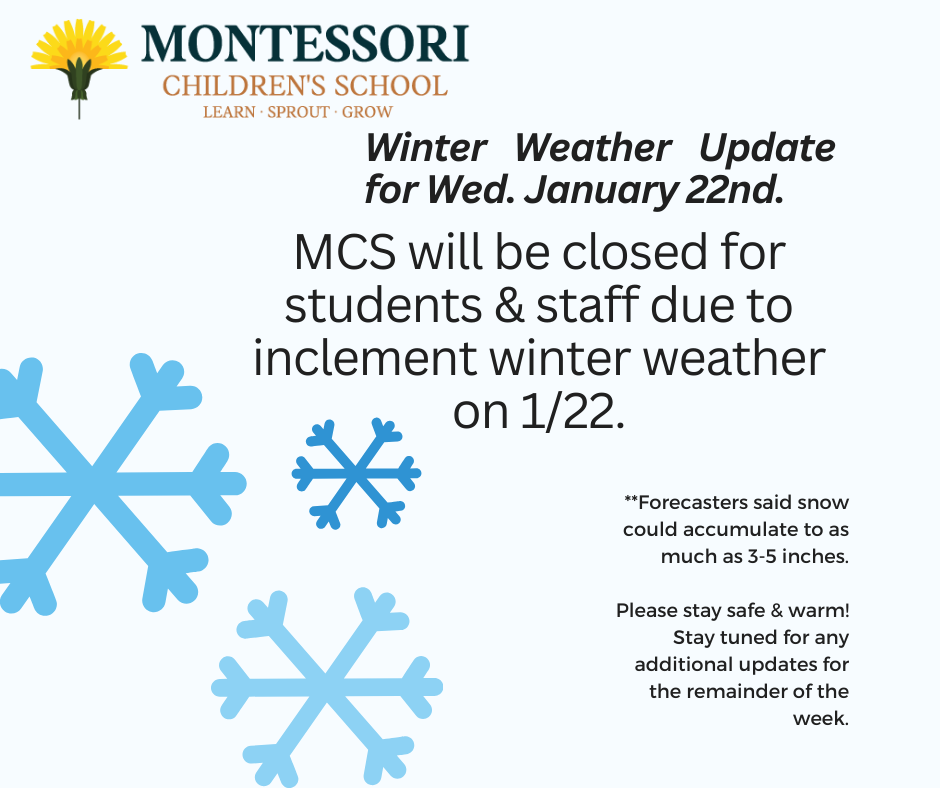- We are currently accepting applications for the 2026-2027 school year.
Programs & Tuition
Program info, tuition, and personal item list
Programs & Tuition
“Montessori Children’s School is exceptional! The teachers and staff are loving, supportive, and take pride in providing an authentic Montessori education. MCS nurtures and encourages a student’s individual interests while providing a sense of community. My children have grown and thrived during their time at MCS. Their self-confidence and self-esteem have flourished along with their love of academics“ -Current Parent
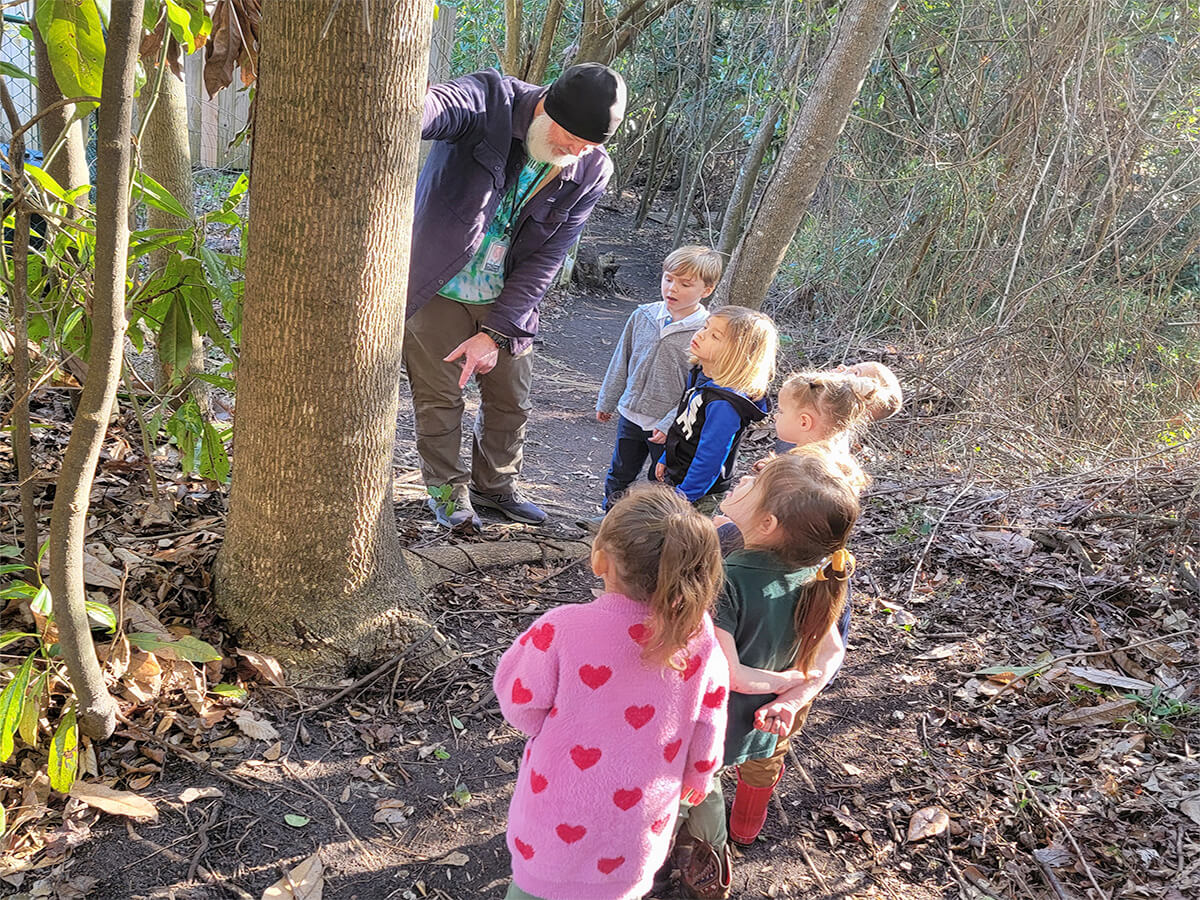
What is Montessori Education?
For over 100 years now, the child-focused approach that Dr. Maria Montessori, an Italian physician, developed for educating children has been transforming schools around the globe.
Montessori classrooms are immediately recognizable. You will see children working independently and in groups, often with specially designed learning materials; deeply engaged in their work; and respectful of themselves and their surroundings.
The Montessori Method fosters rigorous, self-motivated growth for children and adolescents in all areas of their development—cognitive, emotional, social, and physical.
Components of Montessori Education:
- Multi-age classrooms
- Hands-on learning
- Student-centered
- Uninterrupted work cycles
Our Programs
The routines of everyday living are the foundation of our Stepping Stones Toddler program. Activities promote independence, order, coordination, and concentration, as well as support social, emotional, physical, and cognitive development. These learning activities include:
- Self-care: washing, dressing, toileting, and eating, according to each child’s individual capacity
- Care of the environment: cleaning, food preparation and food service; plant care and animal care
- Large-motor activities (indoors and out): walking, climbing, running, jumping, balancing, climbing steps, and more
- Fine-motor skills: reaching, grasping, picking up objects, transferring objects, using tools and utensils, doing art work
- Language: naming objects, describing actions and intentions, discussing pictures, conversation, music, and singing
- Social skills: developing manners through interactions with peers, teachers, and adult-led small group games
Stepping Stones Program Tuition:
5 days per week, full day program, 8:00am-3:00pm – $8,300.00 Annually
A Montessori Primary classroom feels more like a home than a school. You won’t see desks, nor will a teacher stand at the front of the room delivering a lesson to the whole class. Instead, you’ll see children happily working individually or in small groups, at tables or on the floor near small mats that define their own space.
Specially designed learning materials are displayed on open shelves, easily accessible to the children. Classrooms also include low sinks accessible to the children, child-sized furniture, cozy spaces for quiet reading, reachable shelves with work available for free choice, and child-sized kitchen utensils so the students can eat, prepare, and clean up their snack on their own. Teachers gently guide students to help maintain the organization and cleanliness of this environment to keep it orderly and attractive, and to help your child understand how to care for materials and clean up after themselves—skills you will be happy to observe carrying over in your home.
Areas of the Primary Classroom include:
- Practical Life: Children learn daily-life skills, such as how to get dressed, prepare snacks, set the table, and care for plants and animals. Practical Life activities promote independence, and fine- and gross-motor coordination.
- Sensorial: Children refine skills in perceiving the world through their different senses. Sensorial learning helps children classify their surroundings and create order. It lays the foundation for learning by developing the ability to classify, sort, and discriminate—skills necessary in math, geometry, and language.
- Math: Through hands-on activities, children learn to identify numerals and match them to their quantity, understand place-value and the base-10 system, and practice addition, subtraction, multiplication, and division.
- Language: Activities throughout the Primary classroom teach language, help children acquire vocabulary, and develop skills needed for writing and reading. The ability to write, a precursor to reading, is taught first. Using hands-on materials, children learn letter sounds, how to combine sounds to make words, how to build sentences, and how to use a pencil. Once these skills are acquired, children spontaneously learn to read.
- Cultural Studies: A wide range of subjects, including history, geography, science, art, and music, are integrated in lessons in the cultural area of the curriculum. Children learn about their own community and the world around them. Discovering similarities and differences among people and places helps them develop an understanding and appreciation of the diversity of our world, and a respect for all living things.
Primary Program Tuition:
5 days per week, full day program, 7:45am-2:45pm – $7,800.00 Annually
As at all Montessori levels, the Elementary program is based on the belief that children learn best through movement and work with their hands, and provides cognitive, social, and emotional support to help them reach their full potential.
This includes addressing their needs as they enter a new period of development characterized by:
- A transition from concrete to abstract thinking
- Growing interest in socialization
- Thinking and memory that is enhanced by creativity and imagination
- An interest in fairness, social justice, and compassion
Areas of the Elementary Classroom, Grades 1-6:
- Practical Life: Practical Life at the Elementary level shifts from a focus on self-care and fine motor skills, to skills that help children connect with their interests in the outside world, organize their time, and take part in their community.
- Math: The ideas of number concepts, place value, numerals, and related quantities are reinforced and expanded upon within the Elementary program. Newfound purposes for familiar math materials provide children with the means to consider number concepts, mathematical operations, and more complex functions, helping to expand advanced mathematical knowledge and understanding.
- Language: Reading and writing are integral to all subjects in Montessori Elementary, as children express their interests and satisfy their curiosity. Students master conventions with thorough studies of grammar, spelling, and mechanics.
- Cultural studies: Cultural studies are interdisciplinary and integrate zoology, botany, geography, geology, physical and life sciences, and anthropology. Through these lessons, children explore the interconnectedness of all living things.
- Science and Social Studies: Interdisciplinary and integrated studies of geology, geography, physical and life sciences, anthropology, and history are built around “Great Lessons,” a series of dramatic stories that explore the origins of the universe, our planet, and the continuous development of human advancement.
Elementary Program Tuition:
5 days per week, full day program, 7:30am-2:30pm – $7,800.00 Annually
The new developmental stage of adolescence involves different educational needs than those of the Elementary stage. Adolescent or Secondary Programs work with the developmental essence of adolescents to help them live full, vital lives. The approach responds to the unique developmental changes of this stage, which include:
- Physical: Adolescents experience a period of tremendous physical and neurological growth.
- Emotional: They experience self-awareness and self-criticism, emotional ups and downs, and egocentrism. They feel an increased desire for autonomy, along with a susceptibility to peer pressure. It is a time characterized by a tendency toward courage and creativity.
- Social: Adolescents seek solidarity with peers and crave greater independence from adults as they establish their own identity. They are concerned with human welfare and dignity, and may exhibit novelty-seeking and risk-taking behaviors as a response to a tendency to express courage and creativity.
- Cognitive: Adolescents are critical thinkers who persistently ask “why.” They are creative, and have the ability to reason and debate.
Our adolescent program is rooted in hands-on, experiential learning for Grades 7 and 8. The adolescent program also includes advanced courses in language arts, mathematics, sciences, and social studies that are academically challenging. Some components of the program are:
- A community within the classroom that allows opportunities to participate in classroom government and other leadership experiences.
- Experiences in nature that cultivate respect for the environment.
- Micro-economic experiences such as developing and running a business to promote a genuine understanding of currency.
- Responsible and ethical use of technology, with the majority of the school day spent in learning activities and practices that require peer-to-peer and student-teacher interaction.
Adolescent Program Tuition:
5 days per week, full day program, 7:30am-2:30pm – $7,800.00 Annually
Our School Programs
MCS nurtures the individual learning style of each student while maintaining standards of academic excellence.
Aftercare Programs (Available for The Children’s House/Primary, Elementary, and Adolescent). We currently do not offer Aftercare for Stepping Stones.
The MCS Aftercare Program provides a relaxed, comfortable atmosphere. Children participate in outdoor play, arts and crafts, free playtime, and other projects and activities. The program incorporates characteristics of a Montessori environment such as freedom of choice, respect, exploration, movement, and consistency.
Aftercare to 4:15pm – $1500
Extended Aftercare to 5:30pm – add $1500 (total $3000)
Annual School and Supply Fee (non-refundable)
First Child – $700
Sibling Discount per Student – $425
*Please call or e-mail us with questions about our various programs. Tuition listed for each program is annual and can be paid in full or in 10 or 12 monthly installments.
Personal Items Lists 2025-2026
*Click the Personal Items List image for a bigger and printable version.
North Carolina Opportunity Scholarship
We are now a participating member of the North Carolina Opportunity Scholarship Program! This program provides funding of up to $7,468 per year for eligible children who choose to attend a participating nonpublic school. Please visit NC Opportunity Scholarship Program for more details.
Volunteer Hours
We ask that each family’s contribution be the equivalent of 30 hours of Time, Treasure, and Talent (referred to as TTT going forward) or any combination of the three. For contributions of supplies and materials, receipts may be submitted to the office and accounted for on your family’s Volunteer Spreadsheet.
For time spent on a project, fundraising event, or any work done on behalf of the school, the volunteer will receive a credit for $10 per hour toward the balance of TTT.
Please continue to check the Montessori Messenger for changes and updates as our campus needs are continually evolving. Any unfulfilled balance of TTT will be billed as a final invoice for the school year. We greatly value our families and know that each one of you is an important piece of our puzzle that would not be complete without you.
● TIME – Giving the gift of time can come in many different forms. Members of the Board of Directors give generously of their time to help advise the Head of School and provide Governance to the administration. Parents and families donate their time to come and help beautify our campus. Parents also help organize the Fundraisers that are so crucial in maintaining our budget and help provide for the unforeseen expenses that crop up during the year.
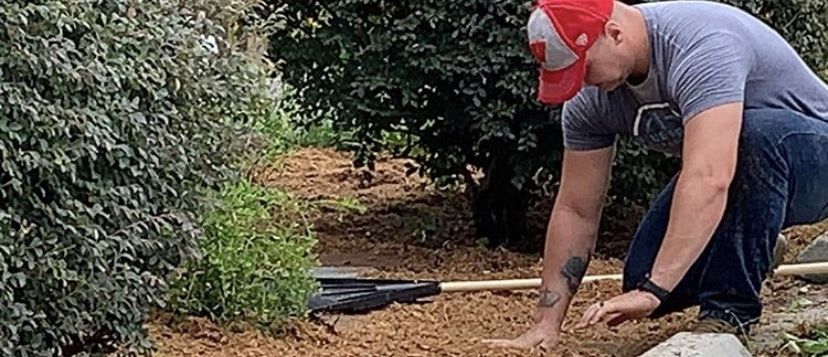
● TALENT – Building skills come in handy when fences, gates, and buildings need replacing or repair. Tech skills are sometimes needed to upgrade and maintain our IT resources. The possibilities are virtually endless for the donation of one’s talent.
● TREASURE – Donations to our Annual Fund help to bridge the gap between our tuition revenue and expenses. Participating in fundraisers and inviting your family, friends, and neighbors to participate as well, are some of the creative ways to help.

